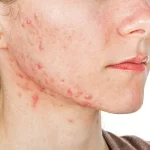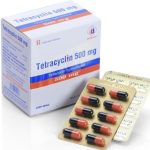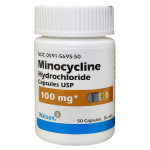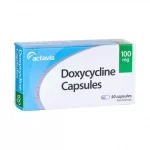If you have attempted to use over the counter solutions for acne and still have issues with acne, you can visit your doctor to discuss the use of antibiotics for acne treatment. You will have to bear in mind however, that it can take some time before the appropriate antibiotic for acne can be identified; the use of antibiotics in treating acne related conditions could become a process of trial and error since the precise causes for acne are not known. You therefore may have to use antibiotics over an extended period or you might be required to try different antibiotics to see which proves the most effective in dealing with your acne eruptions.

What Are The Best Antibiotics for Acne Treatment?
When a doctor offers you antibiotics for acne, you will find there are several different antibiotic forms that a doctor can prescribe. A doctor might prescribe you an antibiotic in the form of an oral medication, as a topical cream or ointment, or a physician may offer you an oral medication along with a solution you can use externally. Whatever medication the doctor offers you, the use of antibiotics for acne helps in destroying acne-causing bacteria. Once acne-causing bacteria are under control, inflamed conditions resolve, and your skin condition eventually improves. There are several common antibiotics prescribed for acne related eruptions including Tetracycline, Polymyxin, Neomycin, and Mupirocin.
Tetracycline
Tetracycline is a medicinal remedy used for destroying acne-causing bacteria. Patients receive this medication if they have infections of the sexual organs, the urinary tract, or other bacterial infections. The medication is in oral or topical form; you may receive a dosage of 500 milligrams, which you will have to consume twice daily. Tetracycline is ideal for men as well as women, but pregnant females should not use Tetracycline antibiotics as an acne treatment. This medication should not be given to children who are younger than nine years of age. When you take Tetracycline antibiotics for acne, you will usually have to take a two-week course of the medication to note improvements in your condition. If you have severe acne eruptions, you might have to take a course of antibiotics even longer than two weeks.
Polymyxin
Polymyxin, sometimes called Polymyxin B Sulfate, is another commonly prescribed antibiotic treatment for acne related conditions. Individuals who have kidney conditions cannot use this type of antibiotic, and pregnant females are not candidates for its use. Polymyxin is most effective on severe acne conditions; this medical solution is identified as a polypeptide antibiotic with bacteria destroying capabilities. Polymyxin promotes rapid healing and has been found effective in treating minor wounds and skin infections; it can hinder and cease the growth of bacteria in and/or on the skin. Polymyxin is commonly offered as a topical application.
Neomycin
Neomycin antibiotics for acne are commonly offered to patients as a medication to be consumed orally. Neomycin has been found to work on healing skin and skin structure related conditions. It is offered in very low dosages and the antibiotic best used to deal with minor acne since the antibiotic is only offered for a short-term period. The medicine cannot be consumed for more than a two-week period. This medication is used by patients before surgical procedures to reduce the potential of developing an infection. It is not recommended for pregnant females, people with kidney conditions, or people with digestive issues like ulcerative colitis or Chrohn’s disease.
Mupirocin
Mupirocin, sometimes identified as Bactroban or Mupirocin topical, is an antibiotic that can be utilized externally for dealing with acne eruptions. This antibiotic helps in preventing the growth of skin bacteria so that acne eventually disappears. Mupirocin has been successfully used to treat an array of skin related conditions, including impetigo. It can provide relief in as little as five days. This antibiotic cannot be used on any open wounds because the product contains a constituent identified as polyethylene glycol: the latter ingredient can damage the kidneys if you absorb too much of the topical application through the skin. The Food and Drug Administration classifies this product as safe for pregnant females, but it cannot be used by nursing mothers.
The Pros and Cons of Antibiotics for Acne
Each antibiotic offered for acne related conditions has advantageous properties and potential side effects. Tetracycline is a powerful antibiotic that proves successfully in dealing with all kinds of acne related conditions; however, it can take a long time to see results. As mentioned earlier, when it comes to minor acne related conditions, you may see results in two weeks, but it can take up to eight weeks to see improvements. When using Tetracycline you will not maximum results in about twelve weeks. Tetracycline is not ideal for children, and it can prove tedious as a topical application since it will have to be applied two times every day until you complete the course of antibiotics. Potential side effects associated with this antibiotic include a yellowing of one’s skin, stinging, skin irritation, and mild burning sensations. Polymyxin has similar side effects with its use; what’s more, when using Polymyxin you might develop fungal infections, especially if the product is used for a long period. More severe side effects include the development of follicultis, hearing loss, or balance issues.
Neomycin is a powerful antibiotic offering speedy, short-term acne solutions. However, potential side effects through its use include a loss of balance, unsteadiness, clumsiness, dizziness, ringing in the ears, and a decrease in urination, abdominal cramping, and diarrhea. If you develop any of the latter conditions, you should speak with your doctor immediately. You may also experience vomiting or nausea when using these antibiotics for acne. Finally, Mupirocin is easy to apply as a topical application and you can see your condition improve in under a week. Potential side effects associated with the use of Muprocin antibiotics for acne include skin irritation, dry skin, peeling skin, redden skin, itchiness, and potential blistering; if you note blistering or skin irritation, do not continue using the product.
Tips for Antibiotics Treatment
No matter which of the numerous antibiotics for acne you are offered, you need to remember that it will take some time before any improvements will be noted. Antibiotics are not an overnight fix for acne eruptions. You must complete the entire course of antibiotics that you are provided if you are going to achieve maximum healing results too. Make sure that you utilize the medication exactly as it is prescribed, and due to the potential side effects caused by some antibiotics, never share your prescribed medication with another person.
If you are supplied with topical antibiotics for acne, apply them as you are directed and always avoid open wounds, your nose, lips, mouth, or eyes when you apply the remedy. You should make a practice of sanitizing your hands before applying topical remedies and clean the affected area to in order to prepare the area for the medicinal application. Finally, if you note the onset of allergic symptoms, cease the use of the medication you are prescribed.





